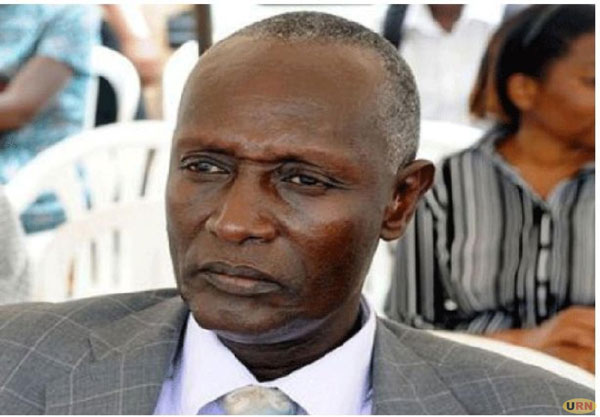
Kampala, Uganda | THE INDEPENDENT | The Supreme Court has upheld a 10-year sentence handed to John Muhanguzi Kashaka, the former Permanent Secretary Ministry of Local Government for causing a 4.2 billion shillings financial loss to the government in the infamous bicycle scandal.
Kashaka’s conviction and sentence were jointly upheld with that of former principal accountant Henry Bamutura, assistant commissioner in charge of Police, while Sam Emorut Erongot who had been handed the highest sentence for 13 years has been set free.
This was in a decision delivered on Tuesday afternoon by a panel of five Justices comprising of Chief Justice Alfonse Owiny-Dollo, Lady Justices Faith Mwondha, Professor Lillian Tibatemwa-Ekirikubinza, Percy Night Tuhaise and Justice Mike Chibita.
The convicts, were in 2014, convicted by the then Anti-corruption court judge Catherine Bamugemereire for various roles they played in contracting a sham company, Ammam Industrial Tools and Equipment Limited to purchase 70, 000 bicycles from India. The said bicycles were to be used by parish and Local Council chairpersons in the 2011 general elections. Up until now, the bicycles have never been delivered.
Bamugemereire sent them to jail, barred them from holding any government office for ten years and ordered them to compensate the government for the loss.
However, the convicts challenged their respective sentences and conviction, arguing that it was harsh and not valid in law. They also argued that the lower court judge erred in law and fact, when, she failed to apply provisions of the PPDA Act in determining the ingredients of the offence of financial loss committed by the appellants, as a result of the procurement transaction.
The Court of Appeal upheld Bamugemerire decision. Dissatisfied with it, they challenged it in the Supreme Court on grounds that the learned Justices of Court of Appeal erred in law when they upheld a conviction of the offence of causing financial loss in the absence of the requisite ingredients.
They also accused the Justices of erring when they failed to examine the facts visa vis the law regarding causing financial loss and also failed to interpret the laws regarding the PPDA Act.
According to the convicts, Justice Madrama presided over the criminal matter in the Court of Appeal as well as a matter at the Commercial Court where 90 percent of the evidence that was used to pin Kashaka and the group in the criminal case was adduced.
Court heard that before Kashaka was convicted, the Attorney General filed a case against Niko Insurance Uganda Limited that offered the performance guarantee of 470,000 dollars that the suppliers of the bicycles were required to come up with.
And when AITEL failed to supply, the Attorney General had to sue the Insurance Company that had offered the guarantee and documents like the charge sheet with the names of the convicts, procurement and contracts were brought in that case as exhibits.
Court further heard that Niko Insurance Company said in its Defense that it was not liable to pay because the local government employees were involved in the fraud.
However, after looking at the evidence in the case, Justice Madrama held that the government employees were not criminally liable and therefore it was the Insurance Company to pay.
The convicts argued through their lawyers Macdusman Kabega and Evans Ochieng that during the case at the Anti-Corruption Court, Kashaka and others were found guilty and that 90 percent of the evidence used was similar to that of the commercial court where Madrama said they were not liable before upholding their conviction when he again sat in the appeal at the Court of Appeal.
In their Judgment today, the Supreme Court has ruled that regarding Justice Madrama failing to recuse himself from the case, that this ground was misplaced and it ought to have been raised in the main appeal or informed Madrama about it when he was handling the appeal case.
They have thus gone ahead and dismissed the claim in which Kashaka wanted the responsibility for the loss shifted to Bank of Uganda, for having been diversionary, unsupported by law or fact and without any single iota of merit. They said he had the responsibility and was to blame over the illegalities committed while in office.
On compensation, they have indicated that whereas the lawyers for Kashaka and Bamutura did not produce any evidence to show that a person cannot be given a custodial sentence and again be ordered to pay compensation , the Prosecution produced evidence to show that the court has powers to grant both a custodial and compensation order .
“Indeed, we are persuaded by the evidence and the law that the 1st appellant and the 2nd appellant were like two peas in one pod and their culpability cannot be separated, even if it were to be done surgically,” said the Justices.
They have added that as submitted by the Prosecution, if Bamutura had not jointly authorized the payments as co signatory to the accounts of the Ministry of Local Government, no payments would have been possible.
“No payments could be made by the sole signature of the 1st Appellant/Kashaka. The 2nd appellant had to append his signature for any payments to be made. Neither was he just a runner stamp. He was the Principal Accountant.
As such, they have found that the Court of Appeal correctly evaluated the evidence and rightly came to the conclusion that Bamutura was as culpable as Kashaka.
The sentence has been read by the Supreme Court Deputy Registrar Mary Babirye on behalf of the Justices and Kashaka appeared in court via zoom connecting to Luzira Prison where he has been serving his sentence.
Bamutura is out on bail and court was silent about cancellation of his bail and issuing a warrant of arrest against him.
***
URN
 The Independent Uganda: You get the Truth we Pay the Price
The Independent Uganda: You get the Truth we Pay the Price





